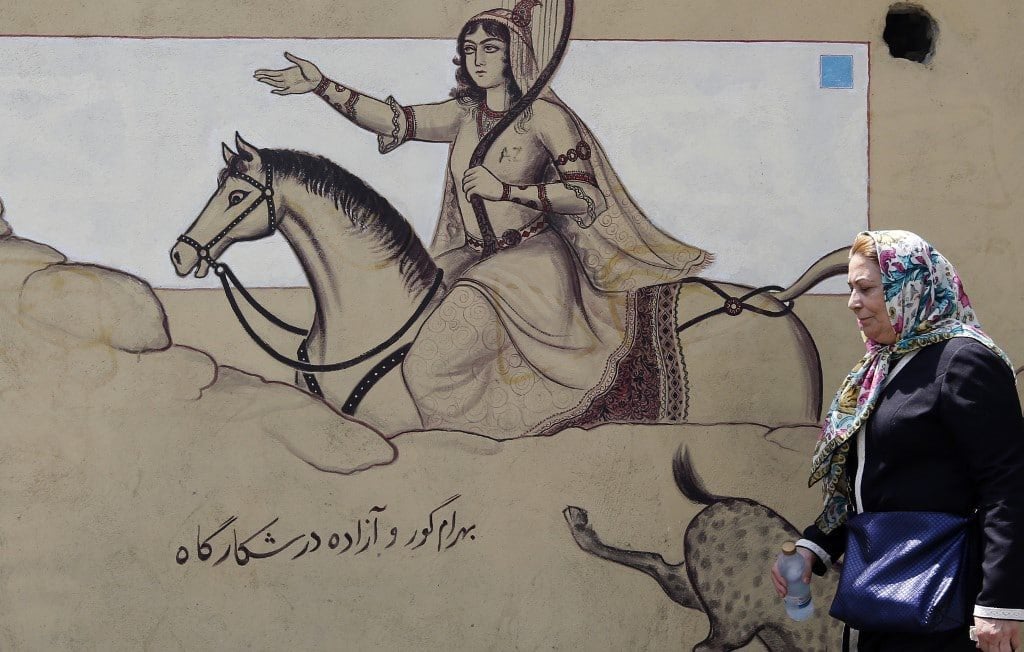
Prof. Dr. Ali Asghar Seyed-Gohrab
The Coronavirus has dislocated lives across the world, like an assassin killing thousands of people, yet it has also inspired people to be creative in art and poetry and to show sympathy for all those afflicted by this vicious virus. From the earliest eruption of the coronavirus in Iran, a large corpus of poetry has been utilized in various contexts to uplift the people’s morale. Classical and modern poems have been painted on buildings, published in newspapers and printed on nurse’s uniforms to wish them luck. Poetry has been used to recognize the bravery and perseverance of front-line workers in fighting the pandemic, and also to satirize a Mullah who suggested rubbing oil of violets on the buttocks as a cure for the virus.
The Sons of Adam Are Limbs of Each Other
A poem by the eminent poet Saʿdi of Shiraz (ca. 1215-1290) has been frequently used during this coronavirus period to express the need for solidarity and sympathy, irrespective of our ethnic, religious, and cultural backgrounds:
بنیآدم اعضای یکدیگرند
که در آفرينش ز یک گوهرند
چو عضوى به درد آورد روزگار
دگر عضوها را نماند قرار
تو کز محنت دیگران بیغمی
نشاید که نامت نهند آدمی
The sons of Adam are limbs of each other
Having been created of one essence.
When the calamity of time afflicts one limb
The other limbs cannot remain at rest.
If thou hast no sympathy for the troubles of others
Thou art unworthy to be called by the name of a man.
(translated by Edward Rehatsek)
These lines occur at the end of the tenth anecdote of chapter one in his masterpiece Golestan or The Rose-Garden. Here Saʿdi recounts how he was praying in the great mosque of Damascus at the grave of John the Baptist when a despotic king unexpectedly arrives on pilgrimage and asks Saʿdi to pray for him. He takes Saʿdi for a pious mystic, a friend of God, whose prayers will be answered.The king says to Saʿdi that the prayer should protect him from a powerful enemy.
Saʿdi avoids praying, and says to him (in Rehatsek’s translation, p. 41), “Have mercy upon thy feeble subjects, that thou mayest not be injured by a strong foe.” And then he advises the king to give justice to his people, and cites the above couplets.
The poem has been put to music several times. The most recent musical interpretation during the coronavirus period is the splendid collaboration among various artists around the world including Teatro Biondo Palermo, the Persian singer Alireza Ghorbani and Pejman Tadayon.
Saʿdi in Diplomacy

Saʿdi was one of the first Persian sages translated into European languages. The first translation appeared in the seventeenth century. He was a favourite poet of the Enlightenment, praised and admired by figures such as Voltaire (1694-1778) and the transcendentalist Ralph Waldo Emerson (1803-1883). Voltaire wrote his Zadig as if it was a translation from Saʿdi. The many applications of this poem in particular, in modern times is a topic for a separate study. Here I will give just a few examples.
Saʿdi’s name and poetry have entered diplomacy. Jimmy Carter (Pres. 1977-1981) cited this poem during a 1978 dinner with Mohammad Reza Shah (1919-1980), to remind him of human rights while also praising the Shah for his leadership, created “an island of stability in one of the more troubled areas of the world.” Shortly after this dinner, the Iranian Revolution (1979) broke out and the Shah fled the country.
President Barak Obama (Pres. 2009-2017) cited the poem in his opening speech in his New Year wish for the Persian Nowruz on 20 March 2009.
Committed to diplomacy, he put threats and intimidation aside, alluding to Iranian civilization several times, emphasizing his wish to renew exchanges for the future between the two peoples based on dignity and mutual respect. By citing Saʿdi’s poem, Obama reached out to show Iranians how the great thirteenth-century Persian sage looked at humanity as one body.
The choice of this poem in such a speech is appropriate, as many Iranians today believe that the poem is inscribed on the entrance of the United Nations Building in New York. According to Mohammad Javad Zarif, Iran’s former permanent representative to the UN and the present foreign minister, this is not true. Zarif sent a five metre square Persian carpet to the UN, with Saʿdi’s poem woven in golden thread just outside the central motif. The carpet hangs in a meeting room. The story that the poem is inscribed on the building is no doubt due to the resonance between the poem’s message of universal empathy and the ideals of the UN (see https://ifpnews.com/zarif-narrates-story-iranian-carpet-hung-uns-wall).
The Poem and the Coronavirus

The poem recurs in various contexts during the corona period. The Spanish Prime Minister Pedro Sánchez cited the poem in Spanish, inviting people to solidarity.
Another occurrence of the poem was on the package “for a batch of test kits donated to Iran by the Chinese Embassy in Iran and local Chinese enterprises,” which China Daily published to show the solidarity between Iran and China.
Foreign Minister Zarif also cited the poem in a tweet to dismiss the US administration’s accusations against China, and criticized the politicization of the health crisis. https://french.presstv.com/. To emphasize his solidarity with the Chinese people, he tweeted an old Chinese poem to express his sympathy. The Iranian President Hasan Rouhani cited the poem in a long letter to the American people on 20 March 2020, soliciting sympathy from the American people and criticizing the Trump administration for the heavy sanctions imposed on Iran:
You, like others in the world, are facing this destructive pandemic and experiencing the bitterness of a concern over your future and that of your loved ones. This time, the surrounding oceans of a continent are not an adequate defense. We know the war on this virus can only be successful if all nations can win this war together, and no affected nation is left behind. This is the other side of globalization coin; a signal that happiness and calamity are both globalized. As Sa’adi, our national poet, recited centuries ago, “Adam’s children are limbs of one body,” an injured limb makes the whole body ill. Thus, no border and no wall can shield any nation from the harm of this or any other virus. (https://iranprimer.usip.org/bl… )
One reason to quote this poem in this pandemic period is indeed due to the poem’s emotive and empathic qualities, shattering all borders and barriers and concentrating on one reality, i.e., the human being. Arshin Adib-Moghaddam refers to this poem in his recent fascinating blog in which he emphasizes how “the coronavirus is all about human connectivity” (https://theconversation.com/bani-adam-the-13th-century-persian-poem-that-shows-why-humanity-needs-a-global-response-to-coronavirus-134836).
The Poem’s Setting at John the Baptist’s Shrine
The original setting of Sa’di’s poem is significant: he is praying at the grave of John the Baptist when an unjust Arab king arrives and entreats him to pray for him. The poet admonishes the king to avoid violence and to treat all people with justice and fairness. Setting the story in the Great Mosque at the shrine of John the Baptist is to defy religious boundaries. John the Baptist is taken as a prophet in Islam, but is a key figure in the Christian narrative. Saʿdi does not pray for the oppressive ruler, but rather invites him to protect himself by fair dealings. Saʿdi depicts himself in this story as a dervish. These dervishes gave blessings to people including rulers, who usually visited such spiritual guides for blessings. Here Saʿdi condemns enmity unequivocally. As a mystic, Saʿdi stands in sharp contrast to the religious jurist, experts on the Laws who are not necessarily considered God’s friends. The mystics’ sole goal is to love God and be with God. They do not worship God for reward or punishment, for the hope of the gardens of Paradise or the fear of hell fire.
Saʿdi’s poem emphasizes how humanity is connected like the limbs of one another. The interdependence of human beings is such that if even one small limb hurts, the other limbs cannot be at ease. The poem’s message is universal, inviting us in a gentle way to reflect on humanity. Using the limbs of the body as a metaphor for the interdependence of humanity, the poet creates a powerful message to respect and cherish all humanity irrespective of religious and ethnic backgrounds. The poet builds a universal emotive layer through his body metaphor for humanity.
Conclusion
Saʿdi condemns callousness and injustice and invites his reader to behave with fairness and justice. The poet’s message is clear: those who hurt people are unable to reflect, and therefore lack empathy, so they cannot be called human.
The coronavirus has shown us how closely humanity is connected. A virus in the furthest corner of the world will have effects on other parts of the globe, killing people and sundering societies. The solution is to cure the limb, behave with fairness, and show sympathy for all. While the poem employs the body image as a metaphor, the coronavirus has shown us that we are literally and materially one body. This is certainly one reason for the Spanish Prime Minister Pedro Sánchez including the poem in his speech to the Spanish people.
The poem has been cited by the Chinese embassy in Tehran, Iranian president Rouhani and Foreign Minister Zarif to solicit readers’ sympathy. In both Rouhani’s and Zarif’s texts, the poem is used to criticize the U.S. government. Especially for those who know the story in Golestan, Zarif and Rouhani are admonishing the Trump administration for injustice, and just as Saʿdi admonished the unjust Arab king. Acting justly, based on empathy, is a prerequisite for being called a human being. In their views, the American administration lacks this humanity.
This and many other classical Persian poems are also used for internal affairs and everyday life in Iran, but that is another story and a far bigger study. This small poem from thirteenth-century Shiraz corresponds perfectly to our cares, anxieties and desires in an age of globalism, showing how such wisdom is timeless. In his Bustān (‘The Orchard’), Saʿdi tells of a famine that made people as emaciated as the crescent moon, and feeble. A rich man named Ibn ‘Abd al-Aziz had a ring with a precious stone. Seeing people in trouble, he sells the ring and gives the money to the poor. He wonders:
چو بیند کسی زهر در کام خلق
کیش بگذرد آب نوشین به حلق
When a person sees poison in mankind’s palate,
How shall sweet-water pass his gullet?
People warn him, saying that he will never have such a ring stone again, but he states that one should choose people’s āsāyesh or ‘comfort,’ ‘ease,’ and ‘well-being’ over one’s ārāyesh or ‘ornament’ or ‘adorning.’ Through internal rhyme and their parallel forms, the two words refer to each other, emphasizing their interdependence. While they outwardly resemble each other, they are actually each other’s antithesis. Āsāyesh refers to people’s physical and psychological well-being, while the word ārāyesh refers to the outward appearance. Here the poet emphasizes that without the inner rest, the outward embellishment is pointless:
مرا شاید انگشتری بی نگین
نشاید دل خلقی اندوهگین
خنک آن که آسایش مرد و زن
گزیند بر آرایش خویشتن
نکردند رغبت هنرپروران
به شادی خویش از غم دیگران
A ring without a stone becomes me well,
But there’s nothing becoming in a grieving people’s heart!’
Happy the one who chooses men and women’s comfort
Before his own adorning:
The virtue-cherishers have not desired
Their own joy at the cost of others’ sorrow!
(translated by G.M. Wickens)
On Saʿdi’s work, studies and translations, see:
- Davis, R., “Saʿdi,” in Encyclopaedia of Islam, Second Edition, Vol. VIII, pp. 719-23.
- Katouzian, H., Saʿdi in Love: The Lyrical Verses of Persia’s Master Poet, London: I.B. Tauris, 2016.
- Lewis, F., “Golestān-e Saʿdi,” in Encyclopaedia Iranica, XI/1, pp. 79-86, available online at https://www.iranicaonline.org/articles/golestan-e-sadi
- Morals Pointed and Tales Adorned, The Bustān of Saʿdi, trans. By G.M. Wickens, Leiden: Brill, 1974, pp. 32-33.
- Rehatsek, E., The Gulistan, Being the Rose-Garden of Shaikh Saʾdi, Benares, 1888 (Reprinted N.Y., 1966; New Humanity Books, 1990).
- Saʿdi, Mosharref al-Din Mosleh, Bustān, ed. Gh. Yusofi, Tehran: Khārazmi, 1375/1996.
- Saʿdi, Mosharref al-Din Mosleh, Golestān, ed. G.H. Yusofi, Tehran: Khārazmi, 1373/1994.
- Saʿdi, Mosharref al-Din Mosleh, The Gulistan of Saʿdi: Bilingual English and Persian Edition with Vocabulary, W.M. Thackston, Bethesda, Maryland: Ibex Publishers, 2008.
- Saʿdi, Mosharref al-Din Mosleh, Kulliyāt, Tehran: Hermes, 1385/2006.
Literature and recommended blogs on the Coronavirus and Iran
-
- Adib-Moghaddam, A. “Bani Adam: the 13th-century Persian poem that shows why humanity needs a global response to coronavirus,” at https://theconversation.com/ba…
- Jazi, Arash, “The Facial Crisis of Shiite Iran at https://religiousmatters.nl/the-facial-crisis-of-shiite-iran
- Shaowcross, W., The Shah’s Last Ride: The Story of the Exile, Misadventures and Death of the Emperor, London: Chatto & Windus, 1989, pp. 129-30.
- Tamimi Arab, Pooyan, “On Secularization and the Coronavirus in Iran” at https://religiousmatters.nl/on-secularization-and-the-coronavirus-in-iran
DISCLAIMER
The opinions expressed in this publication are those of the writer(s). They do not purport to reflect the opinions or views of Fanack or its Board of Editors.
Remark
This article was originally published by https://leidenmedievalistsblog.nl in May 29, 2020.


